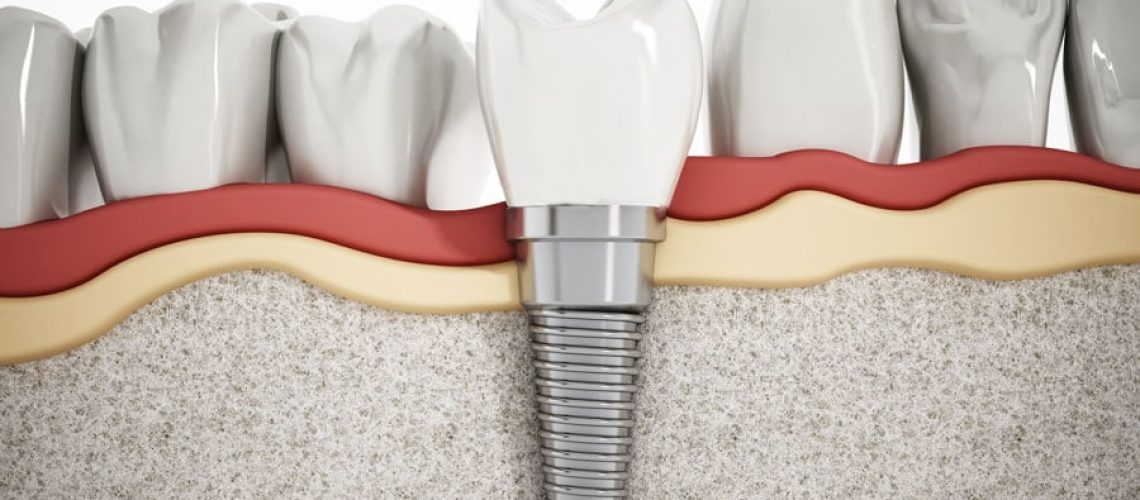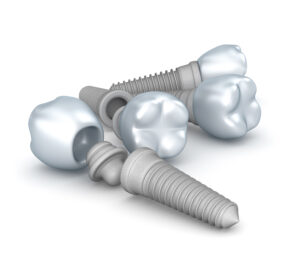 If you are missing some teeth or need to have some pulled, you may be wondering—how do dental implants work?
If you are missing some teeth or need to have some pulled, you may be wondering—how do dental implants work?
A truly revolutionary dental product, dental implants are artificial tooth roots that are placed in the jawbone to provide a foundation for replacement teeth.
Dental implants work by osseointegration, which is a process where the implant fuses with the surrounding bone tissue over time.
Once the dental implant has fused with the bone tissue, it can be used as a foundation for a variety of replacement teeth, including crowns, bridges and dentures.
Because dental implants integrate with the bone tissue, they offer stability and support that other replacement teeth options cannot match.
How Dental Implants Are Inserted
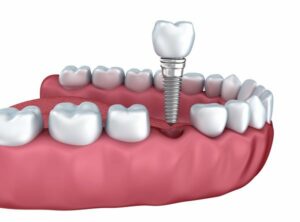 Before your dental implant procedure, your dentist needs to make sure your periodontal structures (gums and jawbone) are healthy enough to support them.
Before your dental implant procedure, your dentist needs to make sure your periodontal structures (gums and jawbone) are healthy enough to support them.
Tooth loss can lead to bone loss in the jawbone over time.
If you have lost teeth, your dentist may refer you to a periodontist (a specialist in gum disease) for a thorough evaluation to see if dental implants are right for you.
Your dentist will also take x-rays and perform other diagnostic tests to determine the location and size of the implant that would be best suited for your individual case.
In some cases, you may need bone grafting prior to dental implant installation if there has been significant bone loss at the site of the missing tooth.
Once it is determined that you are a good candidate for dental implants, your dentist will numb the area where the implant will be placed with a local anesthetic.
Then, using a special drill designed specifically for dental implants, he or she will create a small hole in the jawbone where the implant will reside.
The implant is then placed into the hole in the jawbone. At this point, the implant is not yet fully secured in place. It will take time for the bone and gum tissue to grow around the dental implants—just as with a natural tooth.
After the implant has been placed at the appointment, your dentist will give you a temporary crown (replacement tooth) to wear until the permanent crown is ready.
The permanent denture will be made specifically for you and will be fitted to the exact specifications of your jawbone.
Once the permanent crown is ready, your dentist will remove the temporary crown and secure the permanent crown in place with screws or dental cement.
If you have any questions about dental implants, please ask your dentist. He or she will be happy to answer any questions you may have.
Can Dental Implants Be Done In One Day?
 Most dental implants can be completed in a single day, but there are a few exceptions.
Most dental implants can be completed in a single day, but there are a few exceptions.
If you are missing all of your teeth and need a full set of implants, the process will likely take longer.
If you only need one or two implants, the procedure may be done in as little as a couple of hours.
Can Dental Implants Last a Lifetime?
Dental implants can last a lifetime, but they will need to be serviced and cleaned on a regular basis.
Your dentist will likely recommend that you have your dental implants serviced every 6 months to 1 year.
During your service appointment, your dentist will clean your implant and check the abutment and crown for any signs of wear or damage.
If you take good care of your dental implants, they can last for many years.
How Much Do Dental Implants Cost?
 The cost of dental implants varies depending on where you live, the type of implant you choose and other factors. Generally, dental implants are more expensive than other tooth replacement options, such as dentures or bridges. However, they can last a lifetime if properly taken care of, making them a long-term investment.
The cost of dental implants varies depending on where you live, the type of implant you choose and other factors. Generally, dental implants are more expensive than other tooth replacement options, such as dentures or bridges. However, they can last a lifetime if properly taken care of, making them a long-term investment.
On average, dental implants cost between $2,000 and $4,000 per tooth. Testing for bone loss, as well as possible bone grafting and other surgical procedures have their own costs.
If you are considering dental implants, talk to your dentist to see if they are right for you. Dental implants are a great way to replace missing teeth and can last a lifetime.
When Are Dental Implants Medically Necessary?
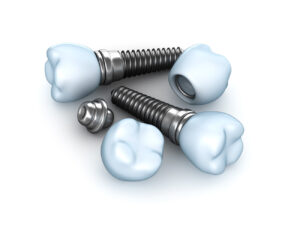 Dental implants may be considered medically necessary when:
Dental implants may be considered medically necessary when:
- You are missing one or more teeth and cannot wear a traditional denture,
- You are unable to wear a traditional denture for any reason,
- You have lost your teeth due to periodontal disease,
- Your teeth are cracked, broken or damaged.
Dental implants are not considered medically necessary when:
- You want to improve the appearance of your smile,
- You are only missing one tooth and can wear a traditional denture,
- Your teeth are healthy and you do not have any cavities.
If you are considering dental implants, talk to your dentist to see if they are right for you.
What Are Dental Implants Made Of?
A dental implant is made of titanium, a biocompatible metal that is accepted by the body. Because of this, the implant is placed in the jawbone and will fuse with the bone over time.
There are some alternatives to titanium such as zirconium, which is also biocompatible.
Which Dental Implants Are The Best?
Dental implants are typically made from the same material, so the implant you choose is mostly based on your personal preference. Some people may prefer the look or feel of one material over another. Talk to your dentist to see what they recommend.
Can Dental Implants Fall Out?
No, dental implants are not like dentures and will not fall out. The implant is fused with the jawbone and will act as a replacement for the root of the tooth.
Can Dental Implants Be Replaced?
Yes, dental implants can be replaced if they are lost or damaged. Typically this is just as easy as installing a new dental crown, which should only take a single dentist appointment.
Do Dental Implants Hurt?
No, dental implants do not hurt. In fact, most people report that they barely feel the implant when it is placed. You may experience some discomfort after surgery, but this will go away within a few days.
How to Care for Dental Implants
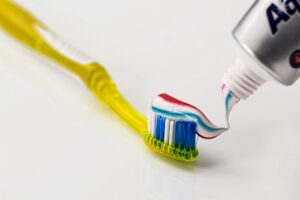 Once your implants have been installed, it’s important to take care of them so that they can heal properly. To do this, you should avoid biting down on anything hard, smoking and drinking alcohol.
Once your implants have been installed, it’s important to take care of them so that they can heal properly. To do this, you should avoid biting down on anything hard, smoking and drinking alcohol.
Once the healing process is done, caring for dental implants is identical to caring for your natural teeth. It’s important to brush and floss regularly and to visit your dentist for regular checkups.
Dental implants are just as strong as natural teeth, so there are no foods or drinks you should avoid in particular—just know that the same products that put you at risk for dental decay are the same that can negatively affect dental implants, both structurally and cosmetically.
